Promoting a culture of life begins at home. And it starts with us, said Danielle Harrison, who kicked off Generation Life in St. Louis.
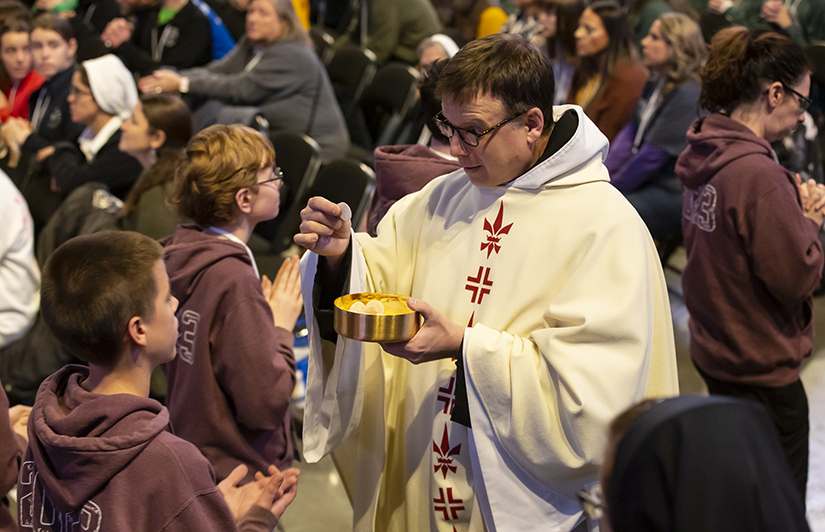 Father Augustine Wetta, OSB, distributed Holy Communion at Mass during the Generation Life conference Jan. 20 at Chaifetz Arena.Photo Credits: Jerry Naunheim Jr. for the St. Louis Review
Father Augustine Wetta, OSB, distributed Holy Communion at Mass during the Generation Life conference Jan. 20 at Chaifetz Arena.Photo Credits: Jerry Naunheim Jr. for the St. Louis ReviewThrough speakers, prayer and spending time together in community, teens and adults who attended the daylong pro-life event Jan. 20 will “understand how God is calling us individually to live out this culture of life,” said Harrison, who got the crowd pumped up. “Life begins in the womb. But it doesn’t stop there. Life continues on and on and on, all the way to natural death. When God says I need you to show my people that life is so important, we have to take up the mantle. It starts with us, and then it grows.”
“Generation Life, are you ready?” she shouted.
“Yes!” the teens resoundingly responded.
About 1,100 eighth-grade and high school teens and adults from the Archdiocese of St. Louis, the Diocese of Springfield-Cape Girardeau, Missouri, and the Diocese of Belleville, Illinois, were represented at the event, held at Chaifetz Arena on the campus of Saint Louis University and organized by the archdiocesan Office of Youth Ministry.
In past years, the Youth Ministry Office has hosted a pilgrimage to Washington, D.C., to the national March for Life in observance of the January 1973 Roe v. Wade decision legalizing abortion. After the Supreme Court’s historic Dobbs decision in June overturning Roe v. Wade, the office shifted gears to a local event focusing on abortion and extending to other life issues.
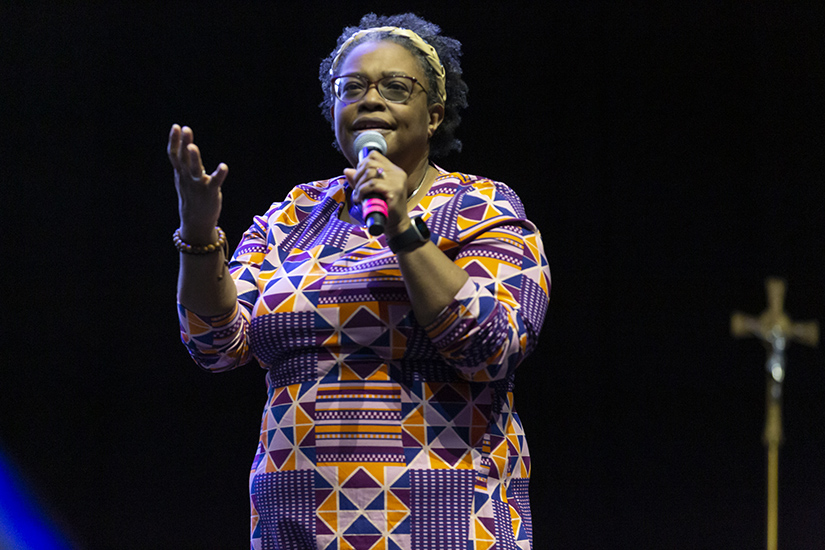 Host Danielle Harrison was the emcee for the Generation Life conference Jan. 20 at Chaifetz Arena. “Life begins in the womb. But it doesn’t stop there,” Harrison said. “Life continues on and on and on, all the way to natural death. When God says I need you to show my people that life is so important, we have to take up the mantle. It starts with us, and then it grows.”Photo Credits: Jerry Naunheim Jr. for the St. Louis Review
Host Danielle Harrison was the emcee for the Generation Life conference Jan. 20 at Chaifetz Arena. “Life begins in the womb. But it doesn’t stop there,” Harrison said. “Life continues on and on and on, all the way to natural death. When God says I need you to show my people that life is so important, we have to take up the mantle. It starts with us, and then it grows.”Photo Credits: Jerry Naunheim Jr. for the St. Louis ReviewThe day included Mass with Archbishop Mitchell T. Rozanski; speakers who touched on the dignity of life from conception to natural death, with topics including the death penalty, immigration and care for the poor; and opportunities to connect with religious communities and organizations and offices that promote a variety of life-related issues.
The morning’s focus on abortion included speaker Krista Corbello, a pro-life speaker and founder of Even This Way, an outreach for individuals whose parents were vulnerable to abortion or who lost a sibling to abortion. Corbello’s mother was pressured to abort her; she later discovered in adulthood that she also had a half sibling by her biological father who was aborted.
Abortion isn’t a biological argument, but rather one that is philosophical, she said. Human life is intrinsic, meaning “in and of itself.” Our value and dignity as human beings comes from within, she said. That means none of the external issues, such as our size, level of development, environment or degree of dependency, should matter.
“Abortion is an act of violence,” which hurts people and families, she said. “We have to rise up to the occasion and do something about it.”
In his homily, Archbishop Rozanski said that despite the Supreme Court’s decision to overturn Roe v. Wade, the fight for life must continue. Comparing it to a runner that slows the pace after completing a marathon, he said that we cannot slow down our efforts to promote a culture of life.
“We have to be the hands and feet, the eyes and ears of Jesus in our world,” he said. “So that we can reach out to those who may be contemplating an abortion, and witness to them the greatest gift that they have is the gift that God has given to them in the womb — the gift of life.”
The archbishop also spoke about the ripple effect that abortion has on other facets of life. “Ever since that decision of Roe v. Wade, we have seen such an increase, not only of abortions, but an increase of violence … of a disdain for life in so many ways,” he said. “Once life is not fully respected in the womb, then life is not respected in any of its forms. That is why we witness to the Gospel of Life and continue to reach out to potential parents contemplating a decision to abort.”
Immigration
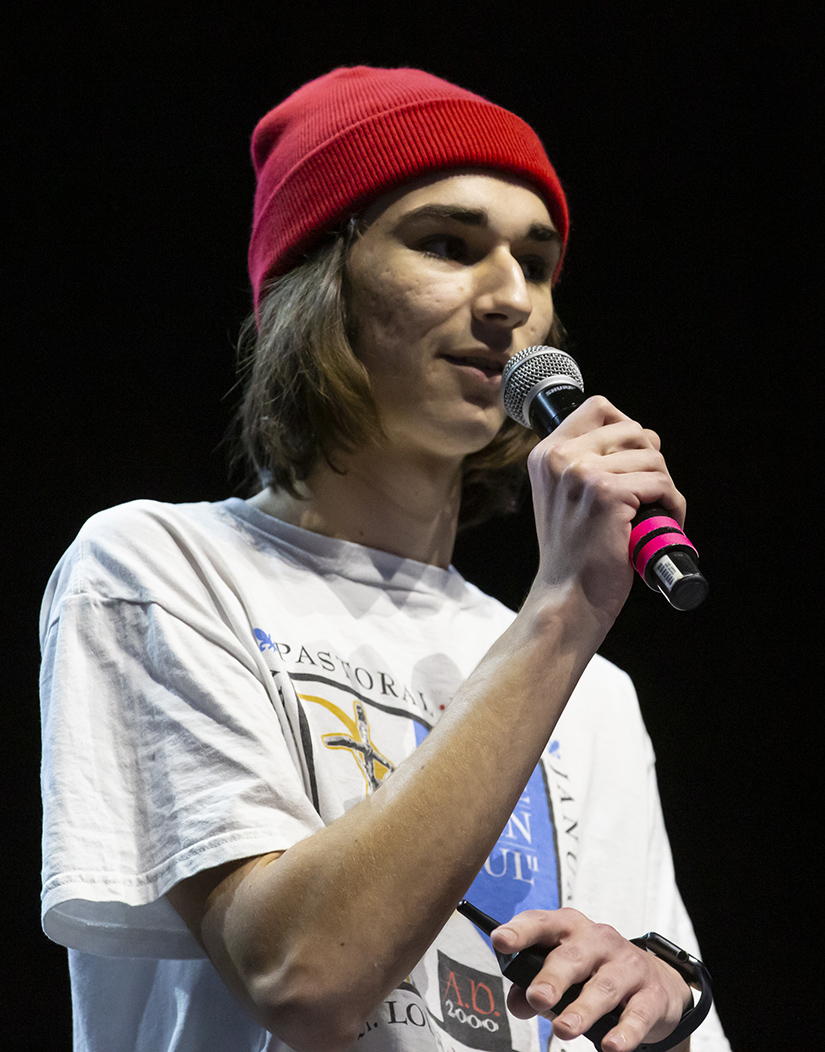 Vianney High School student Chapin Ibendahl was one of the speakers during the Generation Life conference Jan. 20 at Chaifetz Arena. Ibendahl is a parishioner at St. Margaret of Scotland.Photo Credits: Jerry Naunheim Jr. for the St. Louis Review
Vianney High School student Chapin Ibendahl was one of the speakers during the Generation Life conference Jan. 20 at Chaifetz Arena. Ibendahl is a parishioner at St. Margaret of Scotland.Photo Credits: Jerry Naunheim Jr. for the St. Louis ReviewChapin Ibendahl, a senior at Vianney High School and member of the youth group at St. Margaret of Scotland Parish in St. Louis, spoke about his experience attending the Solidarity at the Border pilgrimage in November, which brought teens from the archdiocese to the U.S./Mexico border in El Paso, Texas, for the annual Mass at the Border.
The Mass marked the 25th time that the border cities of El Paso, Las Cruces, New Mexico, and Ciudad Juárez, Mexico, have gathered to pray for those who have died trying to reach the U.S. The pilgrimage also included visits with a migrant woman’s cooperative, the Border Patrol, Sacred Heart Parish in El Paso and Annunciation House, which offers shelter and hospitality to recently arrived migrants in the El Paso-Juarez border community.
Seeing the personal belongings of people who had made it to the border, and the crosses planted there in memory of those who lost their lives trying to come to the United States helped Chapin realize just how real the issue is.
“I was able to see firsthand how people with so little gave up so much to come into this country,” he said. “The wall seemed to strip people of all they had left.”
Death penalty
Jesuit Father Matthew Baugh and Dr. Hank Clever both spoke on the death penalty as a life issue.
Father Baugh, director of Saint Louis University’s Catholic Studies Centre, shared how the Church teaches that the death penalty is “inadmissible because it is an attack on the inviolability and dignity of the person” (Catechism of the Catholic Church #2267).
There are many reasons for eliminating the death penalty, including judicial error (putting the wrong person to death); the presence of racial or other biases; and its ineffectiveness as a deterrent. But those reasons are not why the Church is opposed to the death penalty. It’s because “the dignity of the person is not lost, even after the commission of very serious crime,” said Father Baugh.
Clever shared a personal testimony of his first wife, Rhonda, who was murdered in 1987. Three years later, after her body was discovered and the man who murdered her was identified, Clever told the prosecution not to seek the death penalty, and instead opt for life in prison without parole.
“God loves him every bit as much as He loves me,” Clever said.
The death penalty is easy to justify, because we think we’re protecting society and ensuring that restitution takes place, Clever said.
“It’s only when you really look at it from a Christian — and a particularly Catholic — point of view, that you can really question that,” he said. “God wants all of us to be in heaven. Just as there is great joy in heaven for one repentant sinner, there’s probably great
sadness in heaven for everyone who doesn’t repent. And greater sadness for someone who’s never given a chance to repent.
“I owe it to Him to spread that love and do all I can that every one of His children makes it into heaven,” Clever said. “All of us have the dignity of being His child.”
Building a Culture of Life
Participants had a short opportunity in the afternoon to reflect on several questions, including how they will build a culture of life in their own communities.
Audrey Sherman, a student at Cor Jesu Academy, noted the importance of pro-life resources available to women to help them make life-affirming decisions for their babies.
“It’s kind of hard for us to realize pro-life isn’t just about being against the ending of life,” she said. “But after those babies are born, we need to help them live.”
David Portman, a senior at Chaminade College Preparatory School, has previously attended the March for Life in Washington, D.C. Hearing talks on a variety of life issues, he said, has inspired him to show other people at his school about the dignity of human life.
“There’s a lot of intrinsic (life) issues that we have,” he said. “This helped show that it’s one thing to talk about the beginning and end of life, but it’s through the middle — with the poor and the dignity and suffering of different people. It’s the whole life, no matter what stage of life you’re in.”
Hope Lowery, a student at Villa Duchesne, was inspired by speaker Krista Corbello, who shared that her mother was pressured to have an abortion. Encouraging words from a janitor that Corbello’s mother encountered influenced her decision to forego an abortion.
The message resonated with Hope, who said, “it made me realize that even though I’m one person and my words may not seem that deep and impactful, no matter what … our words do really make an impact on others.”
>> Building a Culture of Life: An act of evangelization
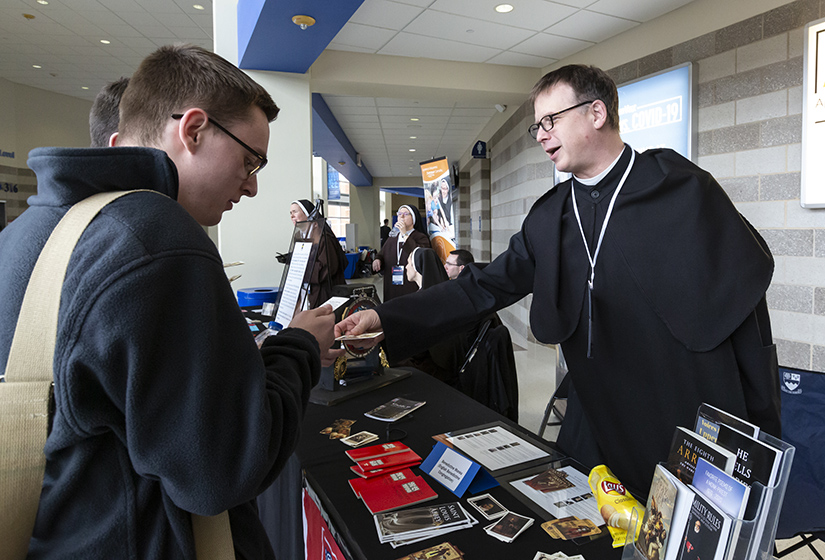 Luke Zehr, left, a seminarian at Kenrick-Glennon Seminary, talked with Father Augustine Wetta, OSB, during the Generation Life conference.Photo Credits: Jerry Naunheim Jr. for the St. Louis Review
Luke Zehr, left, a seminarian at Kenrick-Glennon Seminary, talked with Father Augustine Wetta, OSB, during the Generation Life conference.Photo Credits: Jerry Naunheim Jr. for the St. Louis ReviewA Culture of Life describes a way of life based on the belief that human life at all stages, from conception through natural death, is sacred and has dignity.
The U.S. bishops have said that building a Culture of Life involves having the knowledge and realization of how deeply we are loved by God. That should elicit within us a response of love that simultaneously draws us closer to God and impels us to share His love with others.
Embracing a relationship with God means following in his footsteps, wherever He may call. Just as Jesus invited St. Peter and St. Andrew to become His disciples, He invites us to do the same: “Come after me, and I will make you fishers of men” (Matthew 4:19).
Being a disciple of Jesus naturally includes sharing the Gospel with others and inviting them into a deeper relationship with God. As Christians, our identity and our mission are two sides of the same coin; like the apostles, we are called to be missionary disciples.
This doesn’t necessarily mean quitting our jobs or moving to foreign countries. For most of us, our mission field is daily life: “Christ teaches us how to evangelize, how to invite people into communion with Him, and how to create a culture of witness: namely, through love. A Christian life lived with charity and faith is the most effective form of evangelization” (From “Disciples Called to Witness: The New Evangelization,” USCCB).
The first step toward living this life is allowing Jesus to meet and transform us daily. If we respond to His grace, our lives will show we have something beyond what the world offers: we follow a person whose love changes our lives, so we want others to also experience his transforming love.
When we live in union with God, open to his prompting, we’re more able to see the opportunities for witness and His guidance in responding to these opportunities. We may fear doing the wrong thing or saying the wrong thing, but we do not need to be afraid. Jesus promised his disciples, “I am with you always, until the end of the age” (Matthew 28:20).
When someone is facing great trials, we need to meet them where they are, walk with them on their journey, intercede for them, and be open to sharing Christ’s love however He directs.
When a woman becomes pregnant, and her boyfriend threatens to leave if she continues the pregnancy, we need to lovingly walk with her. When family members or friends become seriously ill, we need to assure them that God still offers them something in this life, and they still have purpose. We need to consistently be with them every step of the way.
Sometimes our actions speak for themselves; other times, words are needed. Whatever the situation, Jesus knows how to speak to each person’s heart; we simply need to follow where He leads.
Excerpts from How to Build a Culture of Life, from the USCCB Committee for Pro-Life Activities
www.usccb.org/committees/pro-life-activities/how-build-culture-life
>> Evangelium Vitae
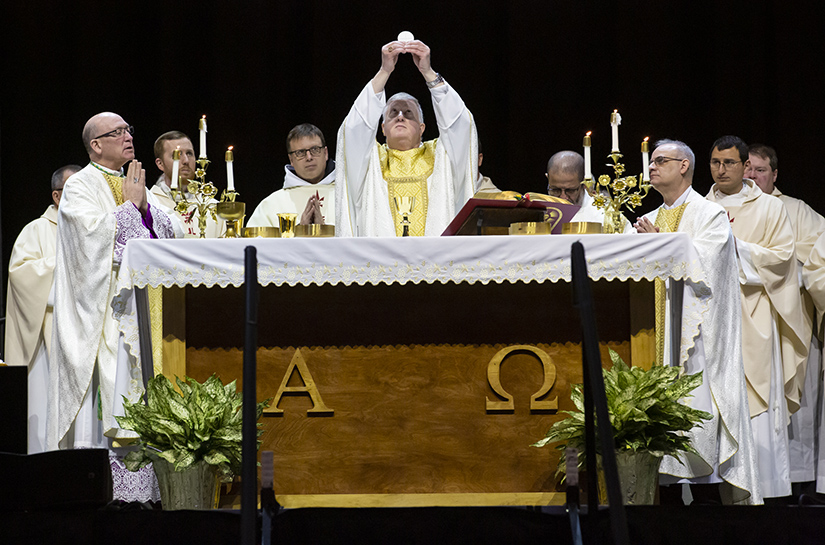 Archbishop Mitchell T. Rozanski celebrated Mass during the Generation Life conference Jan. 20 at Chaifetz Arena. In his homily, Archbishop Rozanski said that despite the Supreme Court’s decision to overturn Roe v. Wade, the fight for life must continue.Photo Credits: Jerry Naunheim Jr. for the St. Louis Review
Archbishop Mitchell T. Rozanski celebrated Mass during the Generation Life conference Jan. 20 at Chaifetz Arena. In his homily, Archbishop Rozanski said that despite the Supreme Court’s decision to overturn Roe v. Wade, the fight for life must continue.Photo Credits: Jerry Naunheim Jr. for the St. Louis ReviewIn his 1995 encyclical
“Evangelium Vitae” (“The Gospel of Life”) St. John Paul II wrote that the Gospel of Life is at the heart of Jesus’ saving message to the world. In taking on human flesh, dwelling among us and sacrificing His very life for our redemption, Christ has revealed the profound dignity of every human person. This God-given dignity does not change with our stage of life, abilities, level of independence or any other circumstance. Our existence as humans is rooted in the fact that each of us is made in the image and likeness of God, created to share in the very life of God Himself.
The Holy Father noted that the Church has a special duty to speak on behalf of those who have no voice. “… Human life, as a gift of God, is sacred and inviolable. For this reason procured abortion and euthanasia are absolutely unacceptable. Not only must human life not be taken, but it must be protected with loving concern.”
To read the full encyclical, see stlreview.com/3XTqNzl
>> Highlights from Generation Life
See highlights from Generation Life on the Review’s Instagram page, @stlouisreview.
To see more photos from the event, see the Generation Life Flickr page: www.flickr.com/photos/genlifestl